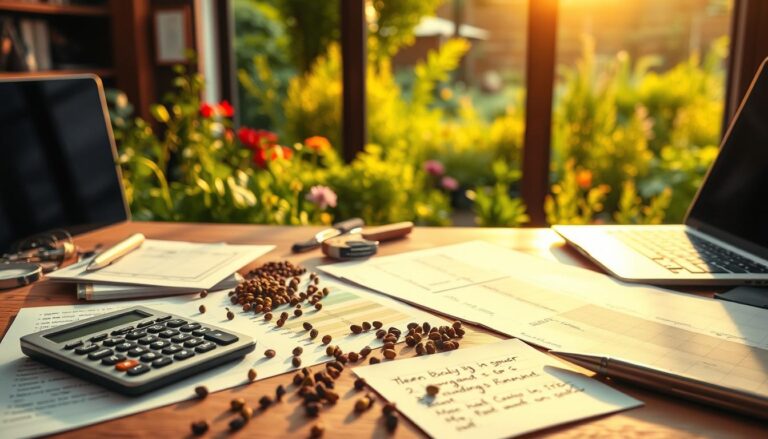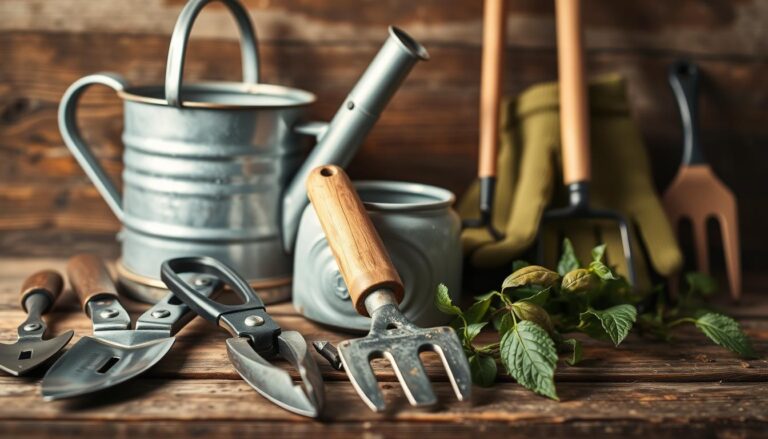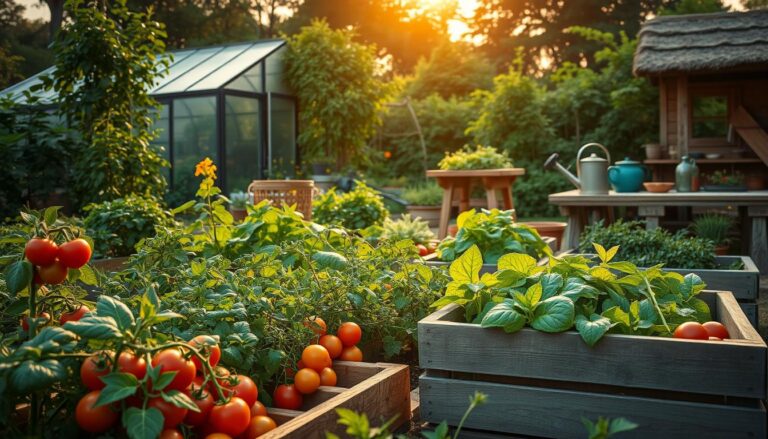Gardening fans are now using eco-friendly gardening solutions to make their gardens better. Composting is a key method. It turns waste into something valuable for your garden.
By starting composting, you cut down on waste. You also make soil that’s full of nutrients, helping plants grow well. It’s a green way to garden that’s good for your garden and the planet.
Exploring composting, you’ll see how it boosts soil health and supports many plants. It also helps make gardening more eco-friendly. Let’s look at why compost is great for your garden.
What is Composting? Understanding the Basics
Composting turns organic waste into a valuable resource for gardening. It’s a natural process that breaks down materials into a nutrient-rich soil amendment. This improves soil health and fertility.
The Science Behind Decomposition
Decomposition is the heart of composting. It involves microorganisms like bacteria and fungi breaking down organic matter. Factors like oxygen, moisture, and temperature affect how fast this happens.
Microorganisms are key in decomposition. They eat organic materials and turn them into simpler compounds. This biological process is vital for creating nutrient-rich compost.
Key Components of Successful Composting
Successful composting needs a mix of “green” and “brown” materials. Green materials include kitchen scraps and grass clippings. Brown materials are dried leaves and straw.
- Green materials add nitrogen, helping microbes grow.
- Brown materials provide carbon, which microbes use for energy.
The Composting Cycle Explained
The composting cycle has several stages. It starts with organic materials breaking down by microbes. Then, there’s a phase of active composting where temperatures rise. Finally, there’s a curing phase where the compost matures.
As experts say, keeping the right conditions is key. This includes enough moisture and air. It’s important for making high-quality compost.
By learning these basics, gardeners can use composting to enhance soil health. It supports plant growth and promotes sustainable gardening.
The Importance of Composting in Gardening
Composting is a simple yet effective way to make your garden better. It turns organic waste into a nutrient-rich soil amendment. This helps plants grow well and cuts down on the need for chemical fertilizers.
How Compost Transforms Garden Soil
Compost makes garden soil better by adding nutrients and improving its structure. It also supports good microbes in the soil. This helps the soil hold moisture, fight off diseases, and support root growth.
“Compost is a gardener’s best friend,” as it boosts soil fertility and makes gardens more resilient.
Economic Benefits of Making Your Own Compost
Creating your own compost can save you money. By using kitchen scraps and yard waste, you make a valuable resource instead of buying it. This can cut down on your gardening costs.
Also, composting reduces waste sent to landfills. This lowers the environmental harm from waste disposal.
Creating a Sustainable Garden Ecosystem
Composting is crucial for sustainable gardening. It turns waste into a resource, reducing the need for outside help. This lowers the garden’s carbon footprint.
As gardening expert, Rhonda Sherman, says, “Composting is a smart way to manage waste. It creates a valuable resource for your garden.”
Nutrient-Rich Compost for Plants: Understanding the Benefits
For gardeners wanting to help their plants grow, compost is key. It makes the soil better by adding nutrients, improving its feel, and helping plants stay healthy.
Essential Nutrients Provided by Compost
Compost is packed with nutrients plants need to grow. It has nitrogen, phosphorus, and potassium, plus other important nutrients. These nutrients are given out slowly, so plants get what they need without getting too much.
Compost helps plants grow well by supporting their roots, leaves, and fruit. Using compost means you use less chemical fertilizers. This makes gardening better for the planet.
How Compost Improves Soil Structure
Compost makes soil better in many ways. It adds organic matter that helps soil hold water, breathe, and feel right. This makes roots grow strong and keeps nutrients in the soil.
For heavy clay or sandy soils, compost is especially helpful. It makes clay soils drain better and sandy soils hold water and nutrients better.
Enhancing Plant Immunity and Growth
Compost also boosts plant health by adding good microbes. These microbes help protect plants from diseases by keeping the soil healthy. This makes plants stronger and helps the garden stay healthy.
Compost also helps plants grow strong and healthy. Strong plants fight off pests and diseases better, needing less chemicals. This makes gardening more balanced and eco-friendly.
Environmental Benefits of Composting
Composting is a step towards a greener future. It helps us reduce our impact on the environment. Its advantages go beyond just gardening.
Reducing Landfill Waste Through Composting
Composting greatly reduces waste that ends up in landfills. By turning organic materials into compost, we keep a lot of waste out of landfills. This action reduces waste through composting and cuts down on methane, a harmful greenhouse gas.
Decreasing Carbon Footprint
Composting also helps lower our carbon footprint. It reduces the need for harmful chemicals like synthetic fertilizers and pesticides. This cuts down on carbon emissions from making and moving these chemicals.
Healthy soils from composting can even absorb more carbon. This helps lower the CO2 in our atmosphere.
Supporting Local Ecosystems
Composting boosts local ecosystems by improving soil health. This supports biodiversity and the local food chain. Experts say composting is key to sustainable gardening, helping our environment.
Types of Composting Methods for Home Gardeners
Whether you’re a seasoned gardener or just starting out, there’s a composting method for you. Composting boosts your garden’s soil health and ecosystem. It’s a rewarding practice for all gardeners.
Traditional Compost Piles
The traditional compost pile is a common and easy method. It involves collecting organic materials in a spot and letting them decompose. This method is ideal for gardeners with ample space and lots of organic waste.
Compost Bins and Tumblers
Compost bins and tumblers are great for those with little space or who want a tidy system. These containers keep composting organized and look better than piles. Tumblers, in particular, make it easy to turn the compost, speeding up decomposition.
Vermicomposting (Worm Composting)
Vermicomposting, or worm composting, uses worms to break down organic matter. It’s perfect for indoor composting and is quite fascinating. Vermicomposting produces high-quality compost rich in nutrients.
Bokashi Composting
Bokashi composting is another indoor method that uses microorganisms to ferment waste. It’s a great option for those who want to compost kitchen waste without attracting pests. Bokashi composting is fast and can handle a wide variety of materials.
Understanding the different composting methods helps home gardeners choose the best one for their needs. This choice enhances their garden’s fertility and sustainability through organic gardening with compost.
What Can and Cannot Be Composted
Knowing what to put in and what to leave out of your compost pile is key. Composting mixes materials that break down into a soil amendment. This improves garden fertility with compost.
Green Materials (Nitrogen-Rich)
Green materials are full of nitrogen and are crucial for composting. Kitchen scraps like fruit and veg peels, grass clippings, and manure from herbivores are examples. These materials feed the microorganisms that decompose the compost.
Brown Materials (Carbon-Rich)
Brown materials are high in carbon and give energy to the microorganisms. Dried leaves, straw, and shredded newspaper are examples. A mix of green and brown materials is needed for a balanced compost pile.
| Material Type | Examples | Nutrient Value |
|---|---|---|
| Green Materials | Fruit and vegetable scraps, grass clippings | High in Nitrogen |
| Brown Materials | Dried leaves, straw, shredded newspaper | High in Carbon |
Items to Avoid in Your Compost
Not everything can go into your compost. Avoid meat, dairy, and oily foods as they attract pests and smell bad. Also, skip weeds with seeds, diseased plants, and anything treated with chemicals to avoid contamination.
Balancing Your Compost Ingredients
A good compost pile has 2/3 brown materials and 1/3 green materials. It’s important to turn it regularly and keep it moist. nutrient-rich compost for plants.
By knowing what can and can’t be composted, gardeners can make a valuable resource. This resource improves soil, supports plant health, and helps with sustainable gardening.
Step-by-Step Guide to Starting Your Compost Pile
Starting a compost pile is easy and helps the environment. It reduces waste and makes soil better for plants. This is good for our planet.
Choosing the Right Location
First, pick a good spot for your compost pile. It should be well-ventilated and easy to get to. It’s best if it’s a bit shaded but not too wet.
Setting Up Your Compost System
You can pick from many compost systems. You might choose a bin, a tumbler, or just a pile. Pick what works best for your space.
Layering Materials Properly
For a good compost pile, mix “green” and “brown” materials. Start with brown stuff like leaves, then add green stuff like kitchen scraps. Keep switching layers until you end with brown on top.
| Material Type | Examples | Nutrient Value |
|---|---|---|
| Green Materials | Kitchen scraps, grass clippings, manure | High in Nitrogen |
| Brown Materials | Dried leaves, straw, shredded newspaper | High in Carbon |
Maintaining Moisture and Aeration
Your compost pile needs to be moist and have air. Keep it like a damp sponge. Turn it often to let air in. This makes composting work better.
Tools That Make Composting Easier
There are tools to help with composting. Turners, aerators, and special bins make it easier. They keep the pile right and speed up composting.
By following these steps, you can make great compost. It will make your garden healthier and help the environment.
Maintaining Healthy Compost Throughout the Year
Composting is a year-round task that needs constant care to make rich soil. Gardeners must watch and adjust their compost piles with the seasons.
Seasonal Composting Tips
Spring is the time to add fresh green stuff like grass clippings and kitchen scraps. Summer needs regular turning to avoid too much heat. Autumn is great for adding brown stuff like leaves. Winter requires keeping the compost warm and dry.
Monitoring Temperature and Moisture
Temperature and moisture are key in composting. The best temperature is between 130°F and 140°F, showing active breakdown. Moisture should be like a damp sponge. Checking often helps avoid dry or wet compost, which slows down breakdown.
Turning Your Compost Effectively
Turning the compost pile is vital for air and faster breakdown. Turn it every few weeks, mixing well. This stops matting and ensures even breakdown.
Accelerating the Decomposition Process
To speed up breakdown, balance green and brown materials. Use compost starters or accelerators. Regular turning and the right moisture and temperature make compost rich for your garden.
Troubleshooting Common Composting Problems
Even with the best intentions, composters may encounter problems that hinder the composting process. Understanding how to address these issues is crucial for maintaining a healthy and productive compost pile.
Dealing with Odors
Unpleasant odors from your compost pile can be a nuisance. Typically, odors are a sign of imbalance or improper maintenance. To mitigate this, ensure your compost has a good balance of “green” (nitrogen-rich) and “brown” (carbon-rich) materials. Turning the pile and ensuring adequate aeration can also help. If odors persist, consider adding more brown materials to absorb the smell.
Managing Pests and Unwanted Visitors
Pests in your compost can be managed by avoiding the addition of meat, dairy, and oily foods, which attract unwanted visitors. Ensure your compost pile is well-balanced and turned regularly. If pests become a significant issue, consider relocating your compost bin to a less accessible area or using pest-resistant composting methods.
Addressing Slow Decomposition
Slow decomposition can be due to a lack of nitrogen, inadequate moisture, or insufficient aeration. To accelerate the process, check that your compost pile has the right mix of green and brown materials, is kept moist (like a damp sponge), and is turned regularly to maintain oxygen flow.
Fixing Wet or Dry Compost
Compost that is too wet or too dry can hinder the decomposition process. For wet compost, add brown materials to absorb excess moisture. Conversely, if your compost is too dry, add green materials or water it appropriately. Regular monitoring will help maintain the optimal moisture level, supporting sustainable gardening practices and ultimately helping to improve garden fertility with compost.
By addressing these common issues, you can maintain a healthy composting process, leading to nutrient-rich compost for plants and supporting your overall gardening goals.
How to Use Compost to Improve Garden Fertility
To make your garden better, learning how to use compost is key. Compost makes the soil richer, giving plants the nutrients they need to grow well. This boosts your garden’s fertility.
Applying Compost to Vegetable Gardens
Compost is great for vegetable gardens. It makes the soil better for plants to grow. Adding compost to the soil helps with drainage, air, and nutrients, making veggies healthier and more productive.
Tip: Mix 2-4 inches of compost into the top 6-8 inches of soil before planting vegetables.
Using Compost for Flower Beds and Ornamentals
Compost also helps flower beds and ornamentals. It makes the soil better and gives plants the nutrients they need. It keeps the soil moist, fights weeds, and keeps the temperature right for flowers and ornamentals to do well.
Making and Applying Compost Tea
Compost tea is a liquid made by soaking compost in water. It’s a good way to give plants a boost of good microbes. To make it, soak 1-2 cups of compost in a 5-gallon bucket of water for 24-48 hours. Stir it a bit to help the microbes grow.
“Compost tea is a powerful tool for gardeners, providing a broad spectrum of beneficial microbes that enhance plant health and resilience.”
Compost as Mulch and Top Dressing
Using compost as mulch or top dressing is also good. It keeps the soil moist, fights weeds, and keeps the temperature right. As it breaks down, it adds nutrients to the soil, helping plants grow well.
Timing Your Compost Applications
When to use compost depends on your garden’s needs. It’s good to use it in the spring before planting and in the fall after harvesting. This keeps the soil fertile all season and gets it ready for next year’s crops.
By using these composting tips, you can really improve garden fertility. This makes your garden healthy and full of life.
Conclusion: Embracing Sustainable Gardening Through Composting
Composting is key to sustainable gardening. It helps gardeners cut down on waste and improve their soil. This makes gardens more fertile and productive.
Composting is very important for gardening. It cuts down on landfill waste and lowers carbon emissions. It also makes soil better for plants to grow. Adding composting to your gardening routine helps the environment and your garden.
Follow the tips and guidelines to start composting. Begin today and see how it changes your garden. Composting is a simple way to make your garden more sustainable and eco-friendly.
FAQ
What is the importance of composting in gardening?
How does composting reduce waste?
What are the benefits of using compost in gardening?
How do I maintain the right moisture levels in my compost pile?
Can I compost weeds with seeds?
How often should I turn my compost pile?
What is the ideal carbon-to-nitrogen ratio for composting?
Can I use compost as a substitute for fertilizers?

Sortemdia nasceu com o propósito de trazer alegria e oportunidades para todos por meio de sorteios gratuitos de prêmios incríveis. O site tem como missão oferecer experiências acessíveis, divertidas e justas para quem deseja concorrer a produtos, serviços e brindes sem pagar nada por isso. Acreditamos que a sorte pode bater à porta de qualquer pessoa — e no Sortemdia, ela pode chegar com apenas um clique.



